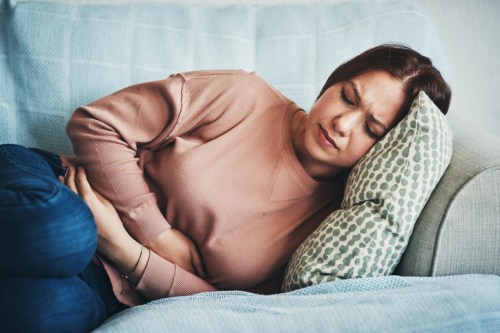If you’ve ever turned off the lights, climbed into bed, and felt attacked by period cramps, you know that they often sneak up out of nowhere at night. But why does that happen and what can we do about it? The truth is that there’s no one-size-fits-all answer. Period cramping is common, but the triggers are different for everyone. Some folks experience them all day and others deal with period cramps at night arbitrarily, Jessica Ritch, MD, board-certified minimally invasive urogynecologist explains. And, of course, sometimes they attack with no rhyme or reason, which might feel like it’s especially the case if you get an early period. Still, if you’re dealing with cramps at night, it is possible that the pain is more noticeable when you don’t have distractions (i.e., when you’re snuggled under your covers and ready to snooze). So, we asked a few gynecologists to break down what causes them and how to find relief.
Experts in This Article
board-certified OB/GYN and chief medical director at Bonafide Health
board-certified OB/GYN and chief medical officer at Seven Starling
What causes cramps in the first place
In case you want a refresher, menstrual cramps are throbbing or pulsating pains in your lower abdomen that start one to three days before your period and usually peak 24 hours after you start bleeding, according to the Mayo Clinic. They can also produce radiating pain in your lower back and thighs. Other period symptoms include diarrhea, anus cramps during periods, sensitive stomachs, headaches, and even dizziness.
Cramps, however, happen because your uterus contracts to expel the uterine lining during your period. As the uterus contracts, it expels the lining as a mixture of blood, cells, and vaginal fluids out of the vagina, according to the American Society of Biochemistry and Molecular Biology. “Hormone-like substances called prostaglandins are released in order to control the muscle contractions of the uterus,” says Amy Roskin, MD, JD, a gynecologist and adjunct professor at Nova Southeastern University. Prostaglandins work to constrict and slow blood flow which causes muscles to contract—and also causes your period pain. Higher levels of prostaglandins are therefore associated with more severe menstrual cramps, Dr. Roskin adds.
What can you do at home to help period cramps
The good news is that, even though cramps are painful, there are a handful of things you can do to feel better. For instance, you can fight cramps with over-the-counter pain relievers, called non-steroidal anti-inflammatory drugs (NSAIDs) like ibuprofen and naproxen. “NSAIDs work as anti-inflammatory agents and block the enzyme that makes prostaglandins (cyclooxygenase), resulting in lower levels of prostaglandins,” says Alyssa Dweck, MS, MD, FACOG, a practicing gynecologist that specializes in female sexual and reproductive health. “Less prostaglandin means less muscular contraction and less pain.” Though all of these experts recommended using them—consult your doctor before taking medications.
Additionally, applying a heating pad to your abdomen or lower back can help alleviate pain. This is because heat encourages blood vessels to expand, which in turn increases blood flow and relaxes muscles, Dr. Roskin adds. Just remember to put your heating pad on a timer or take it off your body before you fall asleep. Prolonged use of heating pads can potentially cause burns and other safety risks. Dr. Ritch adds that a warm bath can reduce pain as well.
Another tactic for reducing cramps at night is sleeping on your side in the fetal position, sometimes with a small pillow between the knees, Dr. Ritch says. This position can help take pressure off the muscles and joints surrounding the uterus, and it’s especially helpful if cramping radiates to the back or down the legs, she adds.
How can you prevent them in the future
When you’re not doubled over in pain from cramps in the middle of the night, there are some preventative measures that you can take to keep intense cramps at bay. Dr. Dweck recommends that you track your period with an app, so you can make sure to hydrate, have your heating pad ready, or take preemptive medicines.
“It may feel counterintuitive, but light exercise like walking or yoga can be beneficial,” Dr. Roskin says. A cursory trial published in the Journal of Alternative and Complementary Medicine found that yoga helped reduce the pain of cramps as well as psychological stress, she explains.
When should you see a doctor
If your period cramps disrupt your life every month, progressively worsen, or you just started having severe cramps after the age of 25, the Mayo Clinic suggests that you seek medical advice. Intense period pain isn’t normal and conditions that impact cramps include endometriosis, uterine fibroids, pelvic inflammatory disease, and cervical stenosis.
To be clear: Period cramps aren’t automatically a sign of reproductive illness, know that it’s always a good idea to listen to your body and pay attention to your symptoms. Chat with your medical provider if you’re concerned. Yes, some light discomfort is common, significant suffering is not an inherent part of menstruation and you deserve to not be in pain.
—reviewed by Andrea Braden, MD, OB/GYN
Oh hi! You look like someone who loves free workouts, discounts for cutting-edge wellness brands, and exclusive Well+Good content. Sign up for Well+, our online community of wellness insiders, and unlock your rewards instantly.
Sign Up for Our Daily Newsletter
Get all the latest in wellness, trends, food, fitness, beauty, and more delivered right to your inbox.
Got it, you've been added to our email list.











